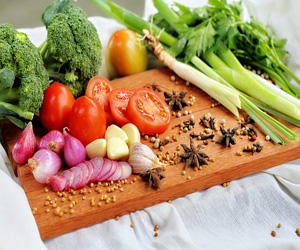


A Recipe For A Better Tomorrow

In a world where convenience often takes precedence over quality, there is a growing movement that seeks to reconnect us with the roots of our sustenance, quite literally. The farm-to-table movement has gained momentum in recent years, driven by a desire for fresher, healthier, and more sustainable food choices. This culinary shift is not just about the food we eat; it's about the impact our choices have on the environment and our local communities.
The concept of "local and sustainable" extends far beyond a trendy catchphrase. It is a philosophy, a way of life, and a promise to future generations. When we choose to embrace local and sustainable practices, we make a positive impact in several key areas.
Supporting Local Farmers: By choosing locally sourced products, we bolster the livelihood of farmers in our communities. These farmers often employ sustainable farming practices, which protect the environment while producing high-quality, fresh food. Supporting local agriculture helps to keep family farms in business, preserving the rural way of life and ensuring a reliable source of food close to home.
Reducing Environmental Footprint: Transporting food over long distances generates a significant carbon footprint. Local and sustainable choices mean that the journey from farm to table is shorter, reducing the environmental impact of our food consumption. Additionally, sustainable farming practices, such as organic farming and regenerative agriculture, minimize the use of harmful chemicals and prioritize soil health, further lessening environmental harm.
Preserving Biodiversity: Local and sustainable agriculture often focuses on heirloom and traditional varieties of crops and livestock. This helps preserve biodiversity, ensuring that unique and heritage breeds and plant varieties continue to thrive. Maintaining a diverse range of species is crucial for resilience in the face of pests, diseases, and changing climate conditions.
Enhancing Food Quality: Local and sustainable food tends to be fresher and more flavorful. This is because it is typically harvested at its peak ripeness, not prematurely for long-distance transportation. As a result, consumers enjoy produce and products that are bursting with flavor and nutrients, contributing to a healthier diet.
Community Building: Choosing local and sustainable options fosters a sense of community. Farmers' markets, local co-ops, and community-supported agriculture programs all create opportunities for people to connect with one another and with those who produce their food. These connections strengthen social bonds and local economies.
Ethical Considerations: Local and sustainable choices often align with ethical considerations regarding animal welfare, fair labor practices, and responsible land management. Consumers who value these principles can be confident that their choices are in line with their personal values.
"Local and sustainable" is not just a trend; it's a fundamental shift in how we view our relationship with the food we eat. It's an opportunity to make choices that benefit ourselves, our communities, and the planet. It's a commitment to quality over convenience, and a promise to savor the flavors of fresh, wholesome food while preserving the rich tapestry of our agricultural heritage. By embracing local and sustainable practices, we can savor a brighter, more sustainable future, one meal at a time.
From Novices To Seasoned Chefs
 For those new to the culinary world, there is an abundance of resources available to help you learn the basics. Cookbooks, online tutorials, and cooking classes are fantastic tools for building a strong foundation. These resources offer clear and concise instructions that empower novices to recreate delectable meals with ease and confidence.
For those new to the culinary world, there is an abundance of resources available to help you learn the basics. Cookbooks, online tutorials, and cooking classes are fantastic tools for building a strong foundation. These resources offer clear and concise instructions that empower novices to recreate delectable meals with ease and confidence.
Exploring New Horizons: As you gain confidence and experience in the kitchen, culinary expertise opens the door to endless possibilities. You can start experimenting with different ingredients, cooking techniques, and flavor combinations. Trying new recipes and exploring various cuisines becomes a source of joy and adventure. The thrill of creating something new and delicious becomes the driving force for many home cooks.
Healthy Eating And Nourishing Meals: Culinary expertise is not just about creating indulgent dishes. It's also about making informed choices for a healthier lifestyle. From scrumptious breakfast options to satisfying lunches and delightful dinners, a culinary journey can incorporate nutritious and wholesome recipes that enhance your well-being. This ensures that everyone can enjoy the benefits of cooking, from improved health to enhanced culinary skills.
Family And Loved Ones: Cooking is a universal language of love and care. Whether you are cooking for yourself, your family, or your friends, the ability to create delicious and nutritious meals brings people together. Sharing homemade dishes is a source of joy, bonding, and togetherness, making culinary expertise a gift that keeps on giving.


 Health And Nutrition: One of the most significant advantages of homemade cooking is the ability to control the quality and nutritional value of your meals. You have full control over the ingredients you use, allowing you to create dishes that align with your dietary preferences and health needs. This control extends to portion sizes, helping you manage your calorie intake and make informed choices about what you eat.
Health And Nutrition: One of the most significant advantages of homemade cooking is the ability to control the quality and nutritional value of your meals. You have full control over the ingredients you use, allowing you to create dishes that align with your dietary preferences and health needs. This control extends to portion sizes, helping you manage your calorie intake and make informed choices about what you eat.
Customization And Creativity: Homemade cooking is a canvas for culinary creativity. Whether you're following a cherished family recipe or experimenting with new flavors, the kitchen is where you can showcase your creativity. You can adapt recipes to suit your taste, experiment with different ingredients, and personalize your dishes to perfection.
Cost-Effective Dining: Eating out at restaurants can be costly, while homemade cooking provides an affordable alternative. Cooking at home allows you to stretch your budget, save money, and make the most of your ingredients. You can also plan meals in advance, reducing food waste and making your groceries go further.
A Delicious Journey Through Nature's Bounty
 Flavors At Their Peak: Foods that are in season are at their peak in terms of flavor and nutritional value. These foods are harvested at the perfect time, allowing them to develop their full flavor potential. A ripe, in-season tomato, for example, bursts with flavor that is unparalleled in taste when compared to its off-season counterpart. The taste of seasonal produce is a testament to the magic of nature.
Flavors At Their Peak: Foods that are in season are at their peak in terms of flavor and nutritional value. These foods are harvested at the perfect time, allowing them to develop their full flavor potential. A ripe, in-season tomato, for example, bursts with flavor that is unparalleled in taste when compared to its off-season counterpart. The taste of seasonal produce is a testament to the magic of nature.
Nutritional Benefits: Seasonal eating offers a variety of health benefits. Seasonal fruits and vegetables are rich in essential vitamins, minerals, and antioxidants. Since they are picked at their peak, they often contain more nutrients than out-of-season produce that has been transported long distances or stored for extended periods.
Environmental Sustainability:Embracing seasonal eating also aligns with eco-conscious living. When you choose foods in season, you reduce the need for long-distance transportation and energy-intensive methods of preservation. This, in turn, lowers your carbon footprint and supports local agriculture. It's a sustainable approach that promotes environmental health and resilience.
Nourishing Your Body One Sip At A Time
 Antioxidant Benefits
Antioxidant Benefits
Antioxidants are nature's superheroes when it comes to fighting off free radicals and preventing cellular damage. Nutrient-packed beverages frequently contain an abundance of antioxidants sourced from fruits, vegetables, and other plant-based ingredients. These antioxidants help protect our bodies from oxidative stress and reduce the risk of chronic diseases.
Weight Management And Digestive Health
Nutrient-packed beverages can be a valuable tool for those looking to manage their weight. A well-balanced smoothie or juice can provide satiety while keeping calories in check. Additionally, they often include dietary fiber, which supports healthy digestion and promotes a feeling of fullness.
Customization And Variety
One of the beauties of nutrient-packed beverages is their versatility. You can customize them to suit your taste and nutritional needs.
 A Variety Of Sources
A Variety Of Sources
The good news is that antioxidants are abundant in a wide range of foods, making it easy to incorporate them into your diet. Fruits such as blueberries, strawberries, and pomegranates, and vegetables like kale, spinach, and broccoli are rich in antioxidants. Additionally, nuts, seeds, and certain spices like turmeric and cinnamon also offer an antioxidant punch. Dark chocolate, tea, and red wine, in moderation, are other delightful sources of antioxidants.
Health Benefits Of Antioxidants
The health benefits of consuming antioxidant-packed foods are numerous and well-documented. Here are some of the ways they can enhance your well-being:
Reduced Risk Of Chronic Diseases: Antioxidants can help reduce the risk of chronic diseases, including heart disease, cancer, and diabetes. By neutralizing free radicals, they protect cells and DNA from damage.
Anti-Aging: Antioxidants play a role in skin health by protecting against UV radiation and environmental pollutants, which can accelerate skin aging.
Improved Immune Function: A diet rich in antioxidants supports a robust immune system, helping the body fight off infections and illnesses.
Enhanced Brain Health: Some antioxidants, like those found in berries and leafy greens, have been linked to improved cognitive function and a reduced risk of neurodegenerative diseases such as Alzheimer's.
Inflammation Reduction: Chronic inflammation is a precursor to many diseases. Antioxidants help dampen the inflammatory response, contributing to overall health.